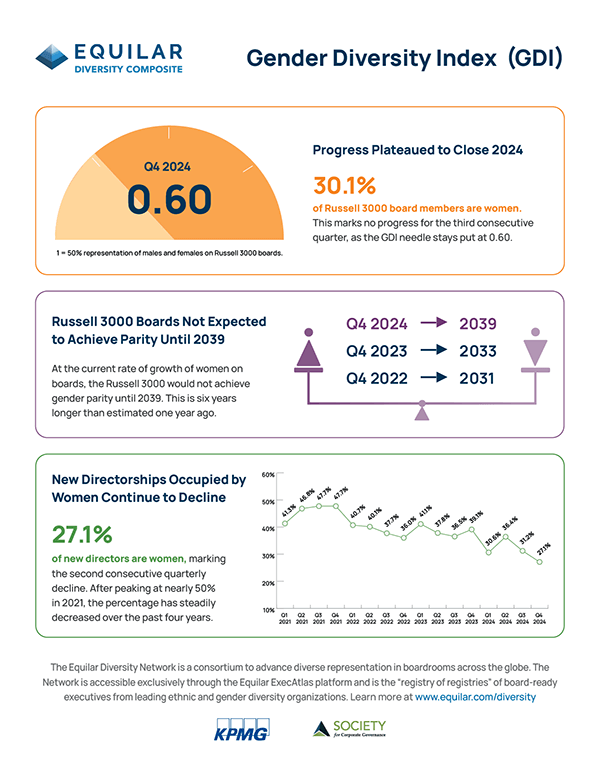Q4 2024 Equilar Gender Diversity Index
Prevalence of Newly Appointed Female Directors Hits Lowest Mark Since 2017
March 07, 2025
Joyce Chen
As the world celebrates International Women’s Day on March 8, the state of diversity remains in limbo. Diversity, equity and inclusion (DEI) has faced significant challenges in recent months, with the rise of anti-DEI movements taking center stage. The potential impacts of these movements are particularly evident in gender diversity on corporate boards, which experienced setbacks during the fourth quarter of 2024, stalling progress towards gender parity. The Equilar Gender Diversity Index (GDI) for Q4 2024 remained stagnant at 0.60 for the third consecutive quarter, where 1.0 represents gender parity between men and women across the Russell 3000.

The estimated timeframe for achieving gender parity in the workplace has been subject to fluctuation. Initially, there was a period of optimism for diversity advocates when the parity projection shortened from 2034 in Q4 2018 to 2030 in Q4 2019, and remained between 2031 and 2033 from Q4 2020 to Q4 2023. However, this trajectory experienced a significant setback in Q4 2024, when the estimated year for gender parity regressed to 2039. This represents the most distant estimated year of parity since the fourth quarter of 2017, when the projection was 2048.
| Year |
Projected Year |
| Q4 2016 |
2055 |
| Q4 2017 |
2048 |
| Q4 2018 |
2034 |
| Q4 2019 |
2030 |
| Q4 2020 |
2032 |
| Q4 2021 |
2032 |
| Q4 2022 |
2031 |
| Q4 2023 |
2033 |
| Q4 2024 |
2039/td>
|
The overall percentage of women on boards has shown a consistent upward trend over the eight years since the GDI’s inception, climbing from 15.1% to 30.1%. While this sustained growth seems optimistic, the prevalence of female directors has plateaued at 30.1% since the second quarter of 2024. Furthermore, the rate of growth has also decelerated in the last three years. Between 2021 and 2022, there was a 16.9% increase in female board representation. However, this momentum slowed to an 8.1% increase between 2022 and 2023, and further declined to 4.5% between 2023 and 2024.
One factor of this decline can be attributed to a lower percentage of newly appointed directors who are women. The data shows that Q4 2024 had the lowest percentage of newly appointed female directors (27.1%) since Q2 2017 (24.9%). While some level of fluctuation is anticipated, the consecutive decrease of 14.2% in both the third and fourth quarters of 2024 stands in sharp contrast compared to the previous 18.8% increase observed in the second quarter of the same year. Overall, the annual percentage of newly appointed female directors in 2024 was 31.7% compared to the 38.7% recorded in 2023, a substantial decrease of 18.1%.
| Year |
New Board Appointments Filled by Women |
| Q1 2017 |
24.3% |
| Q2 2017 |
24.9% |
| Q3 2017 |
32.6% |
| Q4 2017 |
28.6% |
| Q1 2018 |
31.9% |
| Q2 2018 |
34.9% |
| Q3 2018 |
35.6% |
| Q4 2018 |
43.5% |
| Q1 2019 |
46.8% |
| Q2 2019 |
41.9% |
| Q3 2019 |
45.0% |
| Q4 2019 |
45.0% |
| Q1 2020 |
36.5% |
| Q2 2020 |
35.9% |
| Q3 2020 |
40.9% |
| Q4 2020 |
44.2% |
| Q1 2021 |
41.3% |
| Q2 2021 |
46.8% |
| Q3 2021 |
47.7% |
| Q4 2021 |
47.7% |
| Q1 2022 |
40.7% |
| Q2 2022 |
40.1% |
| Q3 2022 |
37.7% |
| Q4 2022 |
36.0% |
| Q1 2023 |
41.1% |
| Q2 2023 |
37.8% |
| Q3 2023 |
36.5% |
| Q4 2023 |
39.1% |
| Q1 2024 |
30.6% |
| Q2 2024 |
36.4% |
| Q3 2024 |
31.2% |
| Q4 2024 |
27.1% |
Despite these challenges, there are some positive trends to note. The percentage of women holding multiple board seats continues to exceed that of their male counterparts, standing at 24.8% and 16.6%, respectively, during Q4 2024. This trend has remained consistent since the fourth quarter of 2016. Furthermore, 63 boards had no female board members in the fourth quarter of 2024, down from 69 boards in the previous quarter.
The growing anti-DEI movement has created a challenging environment for initiatives aimed at promoting diversity and inclusion within organizations. Pushback has been ramping up the past few months and further accelerated by the new Trump administration. On January 22, 2025, The White House released a fact sheet titled “President Donald J. Trump Protects Civil Rights and Merit-Based Opportunity by Ending Illegal DEI." The sheet writes that DEI redistributes opportunities and takes away the focus from merit, hindering individual dignity, hard work and excellence. As a result, the Office of Federal Contract Compliance Programs can no longer push “contractors to balance their workforce based on race, sex, gender identity, sexual preference or religion.”
Despite the resistance, key players in the governance space continue to advocate for diversity. Proxy advisory firm Glass Lewis recently stated that it would continue to consider board diversity in its recommendations, including advising shareholders to vote against directors at companies whose boards lack diversity. However, the firm noted that it would also flag information that could support an alternative vote.
"This approach allows Glass Lewis to deliver the vote recommendations expected by clients while also clearly flagging the potential risk that may result from an AGAINST vote decision and providing a clear path should some clients choose to vote FOR the proposal," the firm said in a statement to Reuters.
Nevertheless, with the uprising in anti-DEI movements, it will be interesting to see whether the trends in 2025 will show progress made toward gender parity.
About Equilar Gender Diversity Index
The Equilar GDI reflects changes on Russell 3000 boards on a quarterly basis as cited in 8-K filings to the SEC. Most indices that track information about board diversity do so annually or even less frequently, and typically with a smaller sample size, sometimes looking back more than a full year by the time the information is published. The Equilar GDI aims to capture the influence of the increasing calls for diversity from investors and other stakeholders in real time.
The Equilar GDI is powered by Equilar ExecAtlas, a database of more than three million board members and executives. ExecAtlas includes exclusive features that show how board members and companies are connected to each other, as well as the Equilar Diversity Network (EDN), a “registry of registries” of board-ready executives from leading ethnic and gender diversity partnerships, organizations, and publications.
Contact

Joyce Chen
Associate Editor at Equilar
Joyce Chen, Associate Editor at Equilar, authored this post. Equilar Researchers Jeremy Ho, Grace Huang, Gabriel Klewin, Erin Le and Yuiko Shimizu contributed data and analysis. Please contact Amit Batish at abatish@equilar.com.
 Solutions
Solutions












